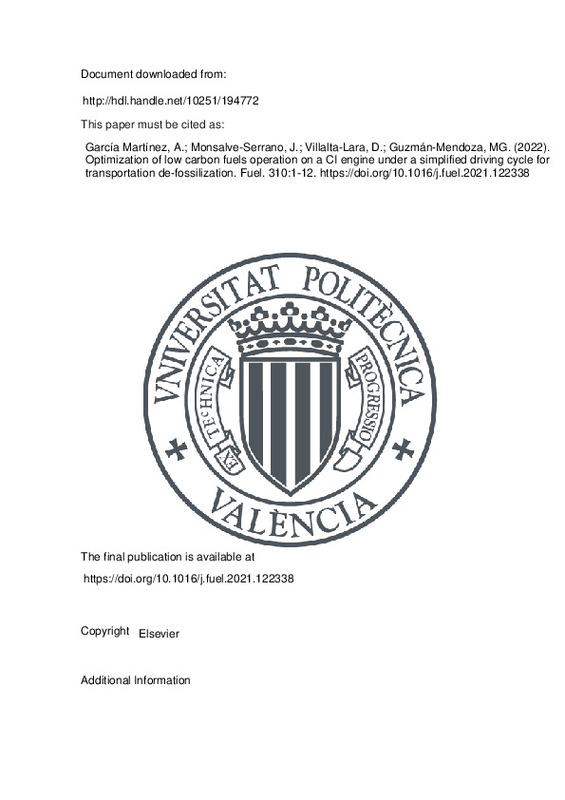JavaScript is disabled for your browser. Some features of this site may not work without it.
Buscar en RiuNet
Listar
Mi cuenta
Estadísticas
Ayuda RiuNet
Admin. UPV
Optimization of low carbon fuels operation on a CI engine under a simplified driving cycle for transportation de-fossilization
Mostrar el registro sencillo del ítem
Ficheros en el ítem
| dc.contributor.author | García Martínez, Antonio
|
es_ES |
| dc.contributor.author | Monsalve-Serrano, Javier
|
es_ES |
| dc.contributor.author | Villalta-Lara, David
|
es_ES |
| dc.contributor.author | Guzmán-Mendoza, María Gabriela
|
es_ES |
| dc.date.accessioned | 2023-07-10T18:02:23Z | |
| dc.date.available | 2023-07-10T18:02:23Z | |
| dc.date.issued | 2022-02-15 | es_ES |
| dc.identifier.issn | 0016-2361 | es_ES |
| dc.identifier.uri | http://hdl.handle.net/10251/194772 | |
| dc.description.abstract | [EN] The study of internal combustion engines, and their associated energy conversion processes, is currently focused on targeting the reduction of pollutant emissions while maintaining or improving efficiency and fuel consumption. The research of alternative fuels, in particular low carbon fuels (LCF), seems to be a promising strategy for solving this problem. However, the characterization of a fuel with properties different than those of diesel requires numerous tests and resources to prove the viability of the substitution for another alternative. In Europe, for a vehicle to be homologated the World harmonized Light vehicles Test Cycle (WLTC) must be complied with. This cycle requires transient tests, that performed with a fuel for which an engine calibration is not yet existent would be difficult and could hinder the evaluation of the potential of a given fuel. This study proposes a cycle simplification methodology that seeks to reduce the driving cycle to a discrete set of stationary conditions, for which each operational calibration can be optimized. The optimization methodology is based on statistical analysis and modelling, and is presented to select the most desirable operating condition that can be reached using an LCF. For each testing point optimization NOx, soot, brake efficiency and fuel consumption are used as targets. Finally, the calibrated operating conditions are applied within the simplified cycle to assess the homologation potential of the studied fuel, as well as the equivalent CO2 emissions under the criteria of a well-towheel analysis (WTW). | es_ES |
| dc.description.sponsorship | The authors thank ARAMCO Overseas Company for supporting this research. | es_ES |
| dc.language | Inglés | es_ES |
| dc.publisher | Elsevier | es_ES |
| dc.relation.ispartof | Fuel | es_ES |
| dc.rights | Reconocimiento - No comercial - Sin obra derivada (by-nc-nd) | es_ES |
| dc.subject | Low carbon fuel | es_ES |
| dc.subject | Engine optimization | es_ES |
| dc.subject | WLTC | es_ES |
| dc.subject | Well-to-wheel | es_ES |
| dc.subject | Homologation | es_ES |
| dc.subject | Statistical model | es_ES |
| dc.subject.classification | MAQUINAS Y MOTORES TERMICOS | es_ES |
| dc.title | Optimization of low carbon fuels operation on a CI engine under a simplified driving cycle for transportation de-fossilization | es_ES |
| dc.type | Artículo | es_ES |
| dc.identifier.doi | 10.1016/j.fuel.2021.122338 | es_ES |
| dc.rights.accessRights | Abierto | es_ES |
| dc.contributor.affiliation | Universitat Politècnica de València. Escuela Técnica Superior de Ingeniería del Diseño - Escola Tècnica Superior d'Enginyeria del Disseny | es_ES |
| dc.description.bibliographicCitation | García Martínez, A.; Monsalve-Serrano, J.; Villalta-Lara, D.; Guzmán-Mendoza, MG. (2022). Optimization of low carbon fuels operation on a CI engine under a simplified driving cycle for transportation de-fossilization. Fuel. 310:1-12. https://doi.org/10.1016/j.fuel.2021.122338 | es_ES |
| dc.description.accrualMethod | S | es_ES |
| dc.relation.publisherversion | https://doi.org/10.1016/j.fuel.2021.122338 | es_ES |
| dc.description.upvformatpinicio | 1 | es_ES |
| dc.description.upvformatpfin | 12 | es_ES |
| dc.type.version | info:eu-repo/semantics/publishedVersion | es_ES |
| dc.description.volume | 310 | es_ES |
| dc.relation.pasarela | S\448111 | es_ES |
| dc.contributor.funder | ARAMCO Overseas Company | es_ES |







![[Cerrado]](/themes/UPV/images/candado.png)

